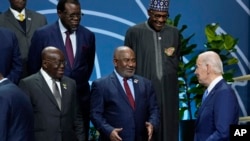WASHINGTON — U.S. President Joe Biden capped a summit of 50 African leaders by stressing his administration's deep commitment to Africa, urging the continent's leaders to respect the will of their people, and saying he may come visit.
The U.S.-Africa Leaders Summit concluded Thursday with bonhomie, $55 billion in U.S. commitments, and this from Biden:
"As I told some of you — you invited me to your countries," he said. "I said, "Be careful what you wish for because I may show up. The poor relatives always show up. The wealthy ones never show up. The poor come and they eat your food and stay longer than they should. Well, I'm looking forward to seeing many of you in your home countries."
He did not give details of the possible trip.
It's a striking joke from the leader of the world's wealthiest nation, who spent much of Wednesday touting U.S. plans to deliver $55 billion in assistance to a continent struggling with food insecurity, inequality and a painful legacy of colonialism.
But jokes aside, the U.S. ambassador to the United Nations told VOA that a presidential trip would have a big impact.
"This will be an opportunity for the people of Africa — whatever countries, if the president decides to make such a visit — that they will actually see our commitment to them," said Linda Thomas-Greenfield, who spoke to VOA on the sidelines of the summit.
Many kinds of diplomacy
These grand gestures and big promises contrast with the quieter diplomacy happening at this summit, which included pull-asides between Secretary of State Antony Blinken and the leaders of Ethiopia and Congo — both countries with active conflicts. In talks with Ethiopia's prime minister, the U.S. "urged accelerated implementation" of a recent peace agreement and "access to the conflict areas by international human rights monitors," the State Department said.
Blinken also met with stable West African ally Senegal, whose president is the chairperson of the African Union, and with the president of Southern Africa energy giant Angola.
Analysts say the U.S. is trying to work with a range of African partners — regardless of their track records — on issues where they can find common ground.
"I think what Washington is trying to do is diversify its relationships on the continent and not make them dependent on any one leader or any one group of countries because what we have seen is these countries remain fragile and a strategic partner today could be engulfed in civil war tomorrow," said Cameron Hudson, an analyst on African peace, security, and governance at the Center for Strategic and International Studies. He spoke to VOA via Zoom.




